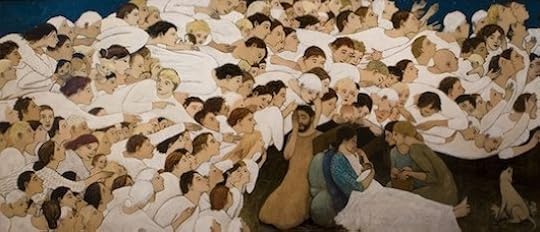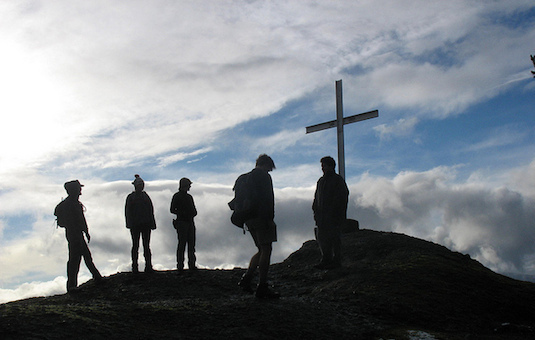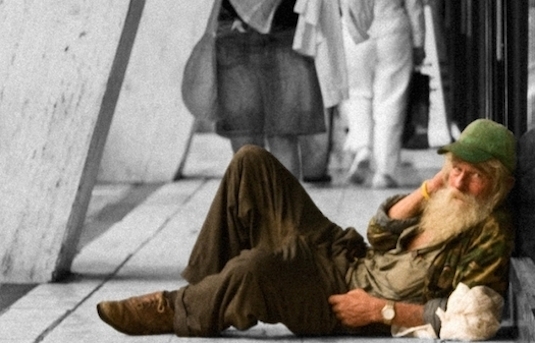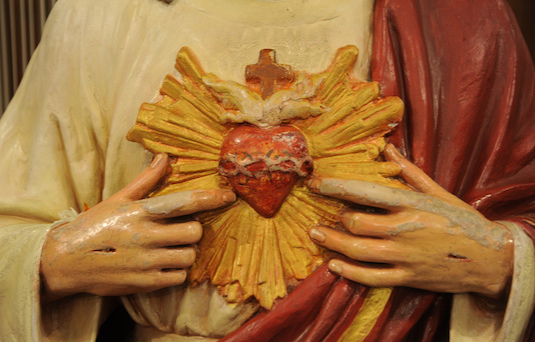Donald Miller's Blog, page 77
December 26, 2013
What I Learned From My Big Brother About Those Who Hurt Me
Recently, my older brother was in a bike accident. He wasn’t going to tell me about it (he hates to draw attention to himself or make a big deal out of things) but I heard the story from someone else and, of course, had a thousand questions. What happened? Are you okay? Were you wearing a helmet?
He was fine, he said. It wasn’t that big of a deal. But I kept pressing him to tell me the rest of the story, until finally he did.

*Photo by Kitty Terwolbeck, Creative Commons
He’d been biking to church when a driver, who had her left turn signal on, turned right instead. She didn’t check her mirrors before she turned, and since my brother was on the right hand side of her, she turned right into him. He went up on her hood, and then down on the ground, although he says he doesn’t remember that part very well. He was wearing a helmet, thank goodness, and he wasn’t badly injured. But his bike was mangled, his bag was ripped, and his arm was a little scraped-up.
As expected, traffic and people lurched to a halt in that moment to make sure my brother was okay. The driver of the vehicle was fairly young, and still learning how to drive. Her instructor was in the passenger seat, and leapt out of the vehicle immediately, apologizing and asking a dozen questions.
Even bystanders stopped and checked, with curious and inquisitive eyes, to make sure my brother was okay.
“What about the driver?” I asked my brother as he told me the story.
“She had her head in against the steering wheel,” he explained, “just sobbing.”
What my brother did next doesn’t surprise me, because he is my brother, and I’ve known him to do similar things. But this is an image that will last in my mind forever, and that immediately shifted my thinking about what to do when someone hurts me. With all the traffic and people still swirling around him, my brother asked the instructor:
“What’s her name?” He pointed to the driver.
“Candace.” The man responded.
And with that, my brother left his broken bike and ripped bag on the sidewalk where they had moved them, and walked to the other side of the car. He knelt down next to the driver-side window, and said, quietly, to the still-weeping young woman: “Candace, it’s okay. Accidents happen. Mistakes are how we learn. Thank goodness everyone is okay. I’m okay. You’re okay. We’re all okay.”
I love that: “I’m okay. You’re okay. We’re all okay.” And I love the image of my brother, the victim in this circumstance, kneeling next to the person who hurt him, who acted carelessly and thoughtlessly, who could have easily taken his life if things had been even slightly different, saying,
“Candace, it’s okay. You’re okay, and I’m okay. We’re all okay.”
Now, I get the analogy can be a little sticky. Because not everyone who hurts us in life is as remorseful as Candace. And not every “close call” turns out as smoothly as this one with my brother. But it just made me think: This is the hope of the Gospel, isn’t it? That because of the power and the blood of Jesus Christ, we might be able to escape death, so to speak? That we might be able to stand up and walk out, free of injury and pain?
That, even in light of our biggest wounds, our closest calls, our most painful experiences, we might be able to say, to ourselves, and to those who hurt us, “It’s okay. I’m okay, you’re okay. We’re all okay.”
• • •My brother’s story changes me — the image of him kneeling there on the ground, hand on Candace’s shoulder, even as she is sobbing. It reminds me to see that I’m okay, even when I make a huge mistake. Even when I hurt someone. It reminds me to pick my head up, and to choose to stop crying. It reminds me to apologize, learn and then keep living, keep “driving.”
And it reminds me, in the most beautiful way I could imagine, that it is possible to look into the face of someone who hurts me and say, “It’s okay. I’m okay, you’re okay. We’re all okay. Thank God.”
What I Learned From My Big Brother About Those Who Hurt Me is a post from: Storyline Blog
December 22, 2013
Christ is Born, Our King has Come
Each Christmas I love taking a few minutes to reflect on Brian Kershisnik’s painting called “Nativity”. It’s not your average depiction of the nativity.
If you click below Kershisnik’s painting, you’ll get a better look at the movement of the piece. The crowd of angels or saints are huddled in mass around Christ, those in front of Him pressing toward the child, but not to stop and gaze, rather to move through and beyond toward something else. It’s an evocative statement.
I think this is Kershisnik’s nod toward God in three persons, the crowd moving on to worship God, as though Christ came to point us toward the Father.
It also reminds me how nothing in God is fixed. God is moving and active and like all of life, in motion. Healthy things grow and move and interact and it’s a stunning depiction of that reality. Notice that in the painting, many of those who have moved past Christ are singing. This is by far my favorite painting of the nativity. Nothing in the painting is dead and everything is in motion.

And I like the expression on the face of Joseph, his hand over the eye closest to the crowd, yet uncovered toward his son. He’s bewildered. He’s moving forward in the burdensome yet awesome responsibility he’s been given in the eternal story.
He seems human, and in dilemma for having been given a child, who was God, but who was also his child. I wonder in what way Joseph loved Jesus. The Child was not His own, biologically. And Joseph knew the child was from God. I think the painter captures something special here.
And the size of Christ, smaller than a baby might be, as though to accentuate the fragility and humanity of God incarnate, nursing, dependent on the creation, all in humility. He became man. And also the litter of puppies at the feet of Mary, perhaps to bring out the earthy reality of birth, and further elaborate the theme of humility. Not that one pup is moving toward the Christ, while the mother is turned toward God. And all of them are lost to the wonder of reality. Beautiful things are happening all around them and they are bewildered and unattached. So much of the world works that way, doesn’t it?
What a beautiful thing Christmas is. Christ has come and come as a child. God incarnate. Hope for the world. And we all move through Him into the presence of the Trinity.
From the Storyline Staff, Merry Christmas.
Christ is Born, Our King has Come is a post from: Storyline Blog
Sunday Morning Sermon – The Great Loss of Growing Up
What have you lost in order to grow up? Sometimes we don’t even realize it is happening.
Out of all the weeks of the year, may this be the week you re-discover your inner child.
Seek Innocence.
Find Joy.
Share Love.
Create Something Beautiful.
Sunday Morning Sermon – The Great Loss of Growing Up is a post from: Storyline Blog
December 21, 2013
The Best Viral Videos We Found This Week
Last week, the WestJet Christmas Miracle video won your vote. What about this week? Please vote for your favorite below in the comments.
The Best Viral Videos We Found This Week is a post from: Storyline Blog
December 19, 2013
A Lesson I’m in Constant Need of Re-Learning
We are taught a lot of things at the age of 13 by our churches and in our youth groups. I remember nights around the campfire at summer camp that profoundly changed the way I thought about Jesus. I remember hearing that my real identity rested in Christ, not in whether boys liked me or what I looked like. Those were the lessons I remember being driven home the most because, as I know now, a girl’s self worth is one of the hardest fought battles in her lifetime. Our youth leaders knew this, so we talked about the subject a lot.
Last spring I traveled to Seattle to watch my big sister speak at a conference called Revolve, a speaking and concert tour for girls ages 13-18. I’ve gone to Revolve to see Jenna four out of the five years she’s spoken on the tour. Each year, about ten minutes into her talk I realize I’m learning as much from her words as the teen girls who bought tickets to the event.
This year was no exception. During the event, she spoke about love — what it means and what it doesn’t. She continued with basic lessons: God is love, Love on earth is God incarnate and the meaningful first few verses of the Gospel of John.
Yet, it was like I had never heard the words that were spilling over the edge of the stage.
It was as if those scriptures and truths had not been uttered over me my entire life. They felt new, and there I was at age 26 re-learning the roots of my self-worth and re-learning that God loved me.

*Photo by Gerry Thomasen, Creative Commons
This makes me wonder, what would it take for these lessons to stick once and for all? What would it take for these lessons to stick permanently? How do I keep them on me? How do I make sure they stay with the girls in the youth group I volunteer with? I see the lessons bouncing off of them all the time, as much as I try to put them back on nice and neat. For truth being what it is — singular, God-breathed and true — it is incredible how resistant our spirits are towards it and how thirsty they are for it. I’m dying of thirst, but I constantly waver in my search for living water.
I think confessing and recognizing our thirst is a continuous, conscious effort.
I guess I am as much in need as the 8th grader sitting behind me at Revolve. In fact, I feel needier now than I did at that age, even though I feel like I should be the one who “gets it”.
Believing Christ and comprehending grace is not a one-time event made while on your knees; it’s a lifetime of “getting it.” If we got it all right now, in one moment, we would probably swell up with too much knowledge of the beauty of truth — think about the blueberry girl from Willy Wonka and the Chocolate Factory who was quickly rolled away to avoid explosion.
The true beauty of the Gospel, we just can’t handle it all at once. But we would die without it in small doses.
A Lesson I’m in Constant Need of Re-Learning is a post from: Storyline Blog
December 18, 2013
The Power of Listening Without Judging
I have a friend who happens to be a rockstar— a strange and confusing word. And yet my friend is one of the more stable people I know.
He doesn’t get down too much when things don’t go his way, and he doesn’t get all that excited when they do. He’s a terrific listener, too, and wants to know more about you than he wants you to know about himself. In a culture that praises fame, my friend hardly notices.
He seems to see music as a service he offers, no different than a waiter bringing more water. He doesn’t think too much or too little of himself. And for the first few years I knew him, I just assumed he was one of those rare people who was given a heaping supply of wisdom and humility, and I think there might be some truth to that. But recently, I met one of the main reasons my friend is so emotionally stable and capable. I met his father.

*Photo by Susieq3c, Creative Commons
I was at a weekend retreat and my friend’s dad happened to be there, and we ended up sharing a room so I got to spend 48 hours or more with him, and engaged in more than a few great conversations. while talking about something I can’t remember, my friend made the statement that he’s made it a priority to never judge his children.
I asked him what he meant by that, and he thought about it for a second and said he always wanted to be the kind of dad who would invite his children to be open and honest about whatever they were dealing with. And he said he thought he’d accomplish that. He said he was often really surprised at how much his sons would tell him about their lives. They’d be out surfing and one of the kids would come over and just start talking, just thinking out loud about whatever they were struggling with.
Why do they feel safe? I asked.
He said that he accomplished this by never judging his kids. He said when they were younger, he would discipline them, for sure, and he would would serve as a teacher and guide, but he’d never allow himself to think less of them or express that they’d lost any “value” in his eyes. He also confessed there were plenty of times when he had to bite his tongue.
Today his sons are adults, married and very successful, and yet they interact with the world as though they are wanted, as though the world would not think less of them because they are human.
It got me wondering about whether I’m a good listener.
What are my motives when I think less of people?
For now, though, I’m wondering if you and I can pay attention to how often we “think less” of people. Try not to “think less” of yourself for doing it, but simply pay attention to when you are living into that mindset. And then ask yourself why… Why am I judging this person? Is it a good thing or a bad thing? If it’s a good thing, what good comes from it? If it’s a bad thing, what are my motives? Are my motives to feel better about myself in comparison?
The Power of Listening Without Judging is a post from: Storyline Blog
December 17, 2013
What Jesus Would Say To Ebenezer Scrooge
On a chilly December morning several years ago, our family packed into the car and headed to church. When I pulled off the interstate, I saw a man sitting on the curb near the end of the exit ramp, holding a cardboard sign.
I was relieved that there was a car in front of me at the stoplight. Frankly, I was not in a good mood and was irritated that he was there. I heard an inner voice whispering something like “Who knows where he’ll spend that money.” So I stared forward, anxious for the light to change and annoyed to find out that this particular light was the first prizewinner in the “slowest light in the country” contest!
The driver’s window of the car in front of us opened. A hand reached out, motioned him over, and gave him a muffin. The man took it, thanked the driver, and returned to his seat. Then the back window opened. This time a hand reached out with a few dollar bills and some change. He thanked the passenger and as he was returning to the curb, the front window rolled down again. (As I said, it was a long light!)
By now, the scene had grabbed the attention of my whole family. It was obvious that the people in the car in front of us were having a different conversation than the one that was going on in my head.
They had given him something and realized that the first gift wasn’t enough.
We leaned forward, anticipating scene number three.
As the man walked to the car, this time he was given a pie, a whole pie, covered in foil. He took it, looked down at it gratefully, and turned to sit down. Tears ran down my wife’s face and our boys watched in wonder. My eyes filled with tears as well, but they were tears of sorrow. Then the light turned green. My thoughts turned inward.
He was naked and I kept the clothes. He was hungry and I ate the food myself. He was thirsty and I made sure I quenched mine. In the time it had taken for a traffic light to turn from red to green, I had not only seen the Gospel lived out in the car in front of me, I’d played the role of Ebenezer Scrooge in Dickens’s A Christmas Carol, the part before Christmas morning dawned.

*Photo by Rian Castillo, Creative Commons
That night, I spoke to my family about what we had witnessed, and what I’d learned about my own heart.
And then we went shopping.
The next Sunday as we pulled onto the exit ramp, a loud “YES!” erupted from my boys in the back seat. He was there again and they were ready. We pulled up next to where he was sitting and rolled our window down. By the time he sat back down on the curb, he had a pair of warm gloves, a knit hat, a cup of hot chocolate, and two donuts. And there was a family who knew his name was Jim.
Jesus often sits beside I-65 holding a cardboard sign.
Sometimes he huddles under bridges as he shields himself from the bitter winter wind. And often he walks the streets downtown and asks strangers for food. I didn’t really understand this until one Sunday morning in early December.
That’s when I saw a family in a car in front of me reaching out a car window, handing him gold, frankincense and myrrh that looked for all the world like a freshly baked pie.
What Jesus Would Say To Ebenezer Scrooge is a post from: Storyline Blog
How to Help the World With a Beard and a Doughnut
It’s amazing to me how my life has changed by small acts of kindness.
I will often pick up my friend Darrell on the way to the Storyline office. A couple of weeks ago, we decided to take a detour to grab a dozen doughnuts when we passed a couple of ladies changing a flat tire. A man with a beard and a flannel shirt had stopped to help them. Any man with a beard is more than capable to change a flat tire, so we kept on driving toward our box of frosting-covered goodness.
As we were driving back to the office, we noticed the bearded man was still changing the tire. It had been nearly 25 minutes since seeing them the first time, so I assumed things weren’t going as smoothly as he planned.
“We should stop and give them some doughnuts,” I said to Darrell at the stoplight just beyond the stranded car.
We both hesitated. Although it would have been a kind gesture, we’d have to turn the car around, get out, approach these strangers … a little extra work.

*Photo by Kiran Foster, Creative Commons
But then we pushed passed our own apathy and decided to stop.
We flipped the car around, got out and I said, “Good morning! My friend and I were driving by on our way to the doughnut shop and thought you all might want one,” while opening up the box. I handed them each a napkin and asked them to pick one.
After a short pause, they reached in for the doughnuts with smiles emerging from their faces.
You see, I knew they were having a rough morning. It was Monday, just after 8am. Their week was already off to a tricky start. But a simple act of kindness changed their perspective completely. I can’t be certain, but I imagine they weren’t telling their peers later that day about the flat tire … they were talking about doughnuts.
We all have the ability to influence the people around us with intentional kindness. (Storyline Blog
December 15, 2013
Want to be Happy? Forgive Your Enemies.
I confess I’m the type of person to hold a grudge. It’s not that I want power over people, which is often the motive for holding a grudge, it’s just that I want all-due glory for my suffering. This is what I mean: if somebody is causing me some pain, I want them to know I am bearing it for them. For this reason, it’s hard for me to forgive my enemies. If people slam me on the internet, it’s hard to forgive. If people screw me in a business deal, it’s hard to forgive, too. And for so long it seemed there was nothing I could do about it.
I knew I’d be better off to forgive, but how?
What are the steps to controlling your uncontrollable emotions?
I don’t fully know the answer to that question. Part of the reason it’s so hard to forgive is pride. If I forgive someone, it feels like I’m also saying that the other person had the right to do me wrong. That doesn’t feel right. But it’s a real feeling.

*Photo by Wonderlane, Creative Commons
Even more difficult is having to forgive someone who hasn’t even recognized they’ve done wrong.
So why forgive?
Before I say why, I should say how. Here’s how:
Go through the stages of grief. Let the offense shock you, then let it completely hurt you. Don’t avoid the pain. Sit with it and feel it no matter how unbearable it is. Please know it will end in time. It will get 2% easier every day. Just feel it like a toothache and soon enough it will transition into something bearable.
Then let the offense make you angry. Don’t lash our or you’ll be guilty yourself. Talk about it with trusted friends but confess you’re angry and your emotions aren’t under control. And don’t feel bad for being angry. The last thing you need is anger and shame. Just punch a pillow and make it through. The anger, like the pain, will lessen over time.
Then after being angry, accept what has been done. Just accept it as a fact and don’t over analyze it. It happened. This will still be shocking at first, but in time, you will accept it as a fact that you can’t change.
From there, you’re at a place to forgive. It will be hard work, but it’s worth it. Sit and pray for the person you’ve been hating. Sit and imagine them with a good life, them coming to realize that what they did was wrong, maybe not to you, but to somebody, perhaps to God. Then be willing to love them in your heart. Want the best for them. Hope for the best for them. Stop praying for God to destroy them and pray for God to bless them. Pray for God to open up their hearts so they can receive the love that will stop them from hurting others. This is the only way I know how to forgive.
• • •
Why should we forgive?
Well, there are many reasons, but I’m only going to focus on a few.
The first is because, believe it or not, forgiveness is a pleasurable experience. No kidding, it feels much better than anger or hate. God has designed forgiveness as a powerful blessing for those who have been hurt. The experience of truly forgiving somebody can make you more happy than if you’d never been hurt in the first place.
The second reason for you to forgive is that it removes you from being entangled in the rather dark thing that hurt you in the first place. If it was a bad business deal, then you get to be free of it and maintain your integrity. If it was a family member talking behind your back, you get to remove yourself completely from all the complications of gossip. Forgiveness sets you free from being bogged down in knee-deep mud. Forgiveness gives you a taste of what it feels like to be God, and it’s a terrific feeling. God forgave us because it gave Him pleasure to do so. He was happy to do so. Love forgives, and so does God, and so can you.
The third reason to forgive is that you open yourself up to amazing possibilities for a happy life. When you don’t forgive, you draw the curtains in your soul and your life gets dark. When you forgive you let the light in again, and you go on about your life in peace. And don’t you want some peace? Isn’t it time for some peace?
The greatest thing about forgiveness is it will allow you to love again. It will allow you to love and be loved.
And believe me, it’s worth it.
Forgiveness is tough, for sure, but love is infinitely more valuable than the pain of forgiveness costs. No matter what you have to go through to forgive, you’re getting a steal of a deal to be able to love and be loved again. Pay the price and I promise you’ll be happy you did.

Want to be Happy? Forgive Your Enemies. is a post from: Storyline Blog
Sunday Morning Sermon — A Lesson From A Restaurant Owner With Down Syndrome
When we think about the things we want to accomplish or achieve in this life, it is easy for us to come up with a list of reasons they will never come true. We tend to focus on our limitations — things we assume will hinder us or hold us back. But what if our limitations are actually an asset to us? Tim Harris is a restaurant-owner who is living proof none of us are as limited as we think.
Tim lives with down syndrome, but he doesn’t allow that to stop him from living his life-long dream of owning a restaurant. Tim’s Place is open daily, and serves breakfast, lunch and hugs.
I think that we all can learn a lot from Tim. I hope his story is as inspiring for you as it was for me.
“I did not let my disability crush the dreams.” — Tim Harris (click to tweet that)
Sunday Morning Sermon — A Lesson From A Restaurant Owner With Down Syndrome is a post from: Storyline Blog
Donald Miller's Blog
- Donald Miller's profile
- 2745 followers



